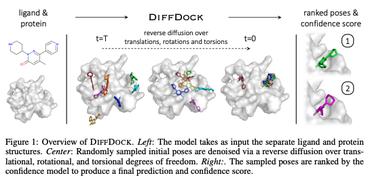Search Results for author: Matteo Aldeghi
Found 9 papers, 7 papers with code
Roughness of molecular property landscapes and its impact on modellability
2 code implementations • 19 Jul 2022 • Matteo Aldeghi, David E. Graff, Nathan Frey, Joseph A. Morrone, Edward O. Pyzer-Knapp, Kirk E. Jordan, Connor W. Coley
In molecular discovery and drug design, structure-property relationships and activity landscapes are often qualitatively or quantitatively analyzed to guide the navigation of chemical space.
A graph representation of molecular ensembles for polymer property prediction
1 code implementation • 17 May 2022 • Matteo Aldeghi, Connor W. Coley
While doing so, we built a dataset of simulated electron affinity and ionization potential values for >40k polymers with varying monomer composition, stoichiometry, and chain architecture, which may be used in the development of other tailored machine learning approaches.
Self-focusing virtual screening with active design space pruning
2 code implementations • 3 May 2022 • David E. Graff, Matteo Aldeghi, Joseph A. Morrone, Kirk E. Jordan, Edward O. Pyzer-Knapp, Connor W. Coley
In this study, we propose an extension to the framework of model-guided optimization that mitigates inferences costs using a technique we refer to as design space pruning (DSP), which irreversibly removes poor-performing candidates from consideration.
On scientific understanding with artificial intelligence
no code implementations • 4 Apr 2022 • Mario Krenn, Robert Pollice, Si Yue Guo, Matteo Aldeghi, Alba Cervera-Lierta, Pascal Friederich, Gabriel dos Passos Gomes, Florian Häse, Adrian Jinich, AkshatKumar Nigam, Zhenpeng Yao, Alán Aspuru-Guzik
Imagine an oracle that correctly predicts the outcome of every particle physics experiment, the products of every chemical reaction, or the function of every protein.
Bayesian optimization with known experimental and design constraints for chemistry applications
1 code implementation • 29 Mar 2022 • Riley J. Hickman, Matteo Aldeghi, Florian Häse, Alán Aspuru-Guzik
The tools developed constitute a simple, yet versatile strategy to enable model-based optimization with known experimental constraints, contributing to its applicability as a core component of autonomous platforms for scientific discovery.
Golem: An algorithm for robust experiment and process optimization
1 code implementation • 5 Mar 2021 • Matteo Aldeghi, Florian Häse, Riley J. Hickman, Isaac Tamblyn, Alán Aspuru-Guzik
Design of experiment and optimization algorithms are often adopted to solve these tasks efficiently.
Assigning Confidence to Molecular Property Prediction
1 code implementation • 23 Feb 2021 • AkshatKumar Nigam, Robert Pollice, Matthew F. D. Hurley, Riley J. Hickman, Matteo Aldeghi, Naruki Yoshikawa, Seyone Chithrananda, Vincent A. Voelz, Alán Aspuru-Guzik
Introduction: Computational modeling has rapidly advanced over the last decades, especially to predict molecular properties for chemistry, material science and drug design.
Olympus: a benchmarking framework for noisy optimization and experiment planning
1 code implementation • 8 Oct 2020 • Florian Häse, Matteo Aldeghi, Riley J. Hickman, Loïc M. Roch, Melodie Christensen, Elena Liles, Jason E. Hein, Alán Aspuru-Guzik
Experiment planning strategies based on off-the-shelf optimization algorithms can be employed in fully autonomous research platforms to achieve desired experimentation goals with the minimum number of trials.
Gryffin: An algorithm for Bayesian optimization of categorical variables informed by expert knowledge
no code implementations • 26 Mar 2020 • Florian Häse, Matteo Aldeghi, Riley J. Hickman, Loïc M. Roch, Alán Aspuru-Guzik
Leveraging domain knowledge in the form of physicochemical descriptors, Gryffin can significantly accelerate the search for promising molecules and materials.

